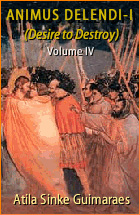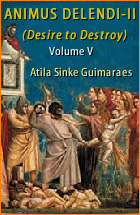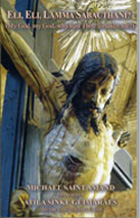About the Church
 |
 |
 |
 |
 |
 |
 |
Preparation for Death & the Last Sacraments
Dear TIA,
I have an inquiry on the topic of death. I and many of us need reminders, and I appeal to your thoroughness in responding to questions. These include:
Thank you,
C.L.F.
TIA responds:
Dear C.L.F.,
There is no more important moment to prepare for in the life of a Catholic than the moment of death. It is at this moment that the eternal destiny of his soul is determined. Today, this truth has been widely forgotten and many do not know how to prepare for death.
Spiritual preparation for Death
Catholics of the past were taught to pray every day for a holy death. There are many prayers written that are petitions for a holy death. One simple and efficacious prayer suitable to say everyday is the “Act of Resignation to the Divine Will”:
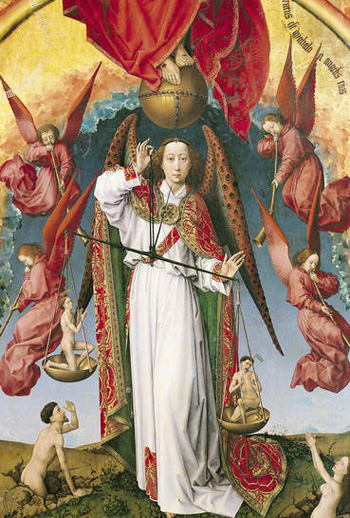 “O Lord, my God, from this moment do I accept from Thy hands, with burning love and sincere contrition, with a calm and willing disposition, whatsoever death Thou shalt choose to send me, with its pains and griefs.”
“O Lord, my God, from this moment do I accept from Thy hands, with burning love and sincere contrition, with a calm and willing disposition, whatsoever death Thou shalt choose to send me, with its pains and griefs.”
In March 9, 1904, Pope St. Pius X granted a plenary indulgence, to be gained at the moment of death, to anyone who recites the above prayer after Confession and Communion. In addition to this prayer, Catholics should pray specifically for the grace to receive Extreme Unction, the Apostolic Blessing and Viaticum before death.
Viaticum means "provision for a journey," that is, Our Lord Jesus Christ is given to the dying person to protect and lead him to eternal life.
It is also beneficial to read good material pertaining to death and judgment. One such good book is Preparation for Death by St. Alphonsus de Liguori. The booklet you mentioned, Prayers for the sick, dying, and deceased, with its many worthy prayers and devotions is highly recommended. It is still available for purchase here.]
Some TIA articles that deal with this subject can be found here, here, here, here and here.
Practical preparations to receive the Last Rites
If a Catholic prepares for death throughout his life, he will find comfort in the graces of the Last Sacraments that will give his soul strength for the journey to the next life. All Catholics should make the necessary preparations and measures to ensure that they, their family members and their friends can receive the Last Rites.
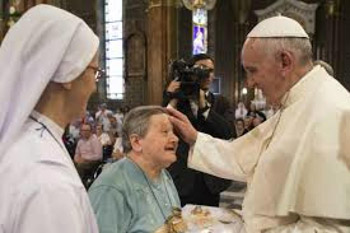 In the current situation, we recommend keeping the contact information of a nearby traditional priest (independent, indult, SSPX, FFSP, Institute of Christ the King, Catholic Eastern rites). A Catholic should not receive Last Rites from a schismatic, so-called orthodox priest.
In the current situation, we recommend keeping the contact information of a nearby traditional priest (independent, indult, SSPX, FFSP, Institute of Christ the King, Catholic Eastern rites). A Catholic should not receive Last Rites from a schismatic, so-called orthodox priest.
It is also good to have on your person or in your wallet or purse a card with the words “I am Catholic, in the case of an emergency, call a priest.” The name and number of your preferred priest should be written on the card. All your family members and friends should also have this information and be informed that you desire to have the traditional administration of Extreme Unction.
If no traditional priest is available, a Novus Ordo priest can be contacted as they can validly administer the Sacraments; however, the new rite of the “Anointing of the Sick” is seen by most Novus Ordo priests more as a blessing than a Sacrament and little mention is made of asking God pardon for sins. In some instances, the priest merely gives the person a blessing rather than anointing them with the Holy Oil. Also, many Novus Ordo priests have little to no sacrality and seriousness when they administer the Sacraments.
Indeed, the typical Novus Ordo priest’s understanding of the Last Sacrament can be understood from USCCB’s instruction page for the “Anointing of the Sick.” More emphasis is placed on the person’s healing and little to no mention is made of death or his private judgment.
The webpage concludes by saying: “But even if there is no physical healing, the primary effect of the Sacrament is a spiritual healing by which the sick person receives the Holy Spirit's gift of peace and courage to deal with the difficulties that accompany serious illness or the frailty of old age.” No mention of death is made.
Because of these progressivist ideas, we recommend that you make the effort now to make arrangements to receive the traditional rites for the Last Sacraments.
Preparing for the priest
There are preparations that ought to be made in a Catholic home to make it ready for the priest to come and administer the Sacraments to dying family members.
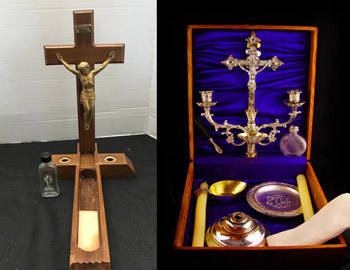 Catholic homes of the past used to have “Sick Call Sets” in their homes that included two blessed candles, holy water, a standing crucifix, a small white tablecloth, two small dishes (one to hold water for the priest to rinse his fingertips in after giving the sick man Communion and the other to hold salt or cotton balls to absorb oil from the priest’s fingertips after anointing the man with oil), and a linen cloth for the priest to dry his fingers on.
Catholic homes of the past used to have “Sick Call Sets” in their homes that included two blessed candles, holy water, a standing crucifix, a small white tablecloth, two small dishes (one to hold water for the priest to rinse his fingertips in after giving the sick man Communion and the other to hold salt or cotton balls to absorb oil from the priest’s fingertips after anointing the man with oil), and a linen cloth for the priest to dry his fingers on.
All of these items were placed in a sturdy box, and sometimes inside a crucifix or religious image that included a drawer or opening made expressly for that purpose.
In the past when the priest carried the Blessed Sacrament to a dying person, he wore the surplice and stole and was accompanied by an attendant who carried a light and rang a bell to announce the presence of the Holy of Holies. When the people heard the ringing bell, they would stop what they were doing to kneel to pay reverence to Our Lord in the Host.
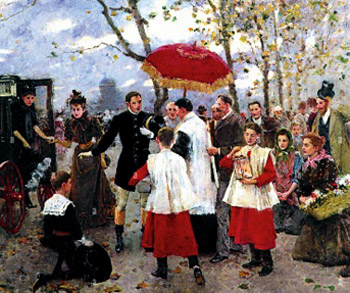 It is related that whenever the path of Queen Maria Christina of Habsburg crossed with the Viaticum in the street, she would get down from her carriage with her ladies, kneel to worship It, give the priest her carriage, and then accompany the Viaticum on foot to the sick person’s house.
It is related that whenever the path of Queen Maria Christina of Habsburg crossed with the Viaticum in the street, she would get down from her carriage with her ladies, kneel to worship It, give the priest her carriage, and then accompany the Viaticum on foot to the sick person’s house.
She would, often even escort the priest with her retinue back to the church from which they had come.
It is proper then, for the household to piously await the coming of the priest, and to receive him carrying the precious Host on their knees. The priest should then be escorted into the sick room in a solemn procession. There should be no trivial talk or joking.
The Sacrament of Extreme Unction
Extreme Unction is traditionally administered after the priest has heard the dying man’s Confession and received Holy Communion, which is referred to as Viaticum. The priest begins this solemn Sacrament by saying a set of prayers that call upon Our Lord, the Angels and Saints to drive away devils from the home and the dying man. The final prayer is as follows:
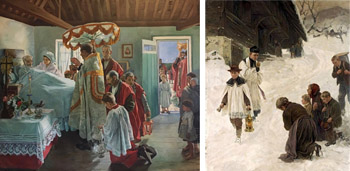
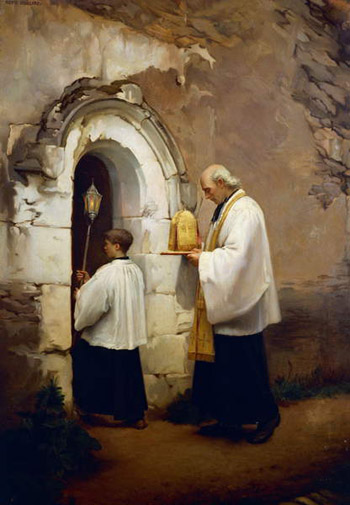 “In the Name of the Father, and of the Son, and of the Holy Spirit, let there be extinguished in you all power of the Devil by the imposition of our hands, and by the invocation of the glorious and holy Mother of God, the Virgin Mary, and of her illustrious Spouse, St. Joseph, and of all the holy Angels, Archangels, Patriarchs, Prophets, Apostles, Martyrs, Confessors, Virgins, and of all the Saints together. Amen.”
“In the Name of the Father, and of the Son, and of the Holy Spirit, let there be extinguished in you all power of the Devil by the imposition of our hands, and by the invocation of the glorious and holy Mother of God, the Virgin Mary, and of her illustrious Spouse, St. Joseph, and of all the holy Angels, Archangels, Patriarchs, Prophets, Apostles, Martyrs, Confessors, Virgins, and of all the Saints together. Amen.”
After this, the priest anoints the sick person in the places that are the portals to his senses: the eyelids, ears, nostrils, lips, hands and feet, saying:
“By this Holy Unction + and his own most gracious mercy, may the Lord pardon you whatever sin you have committed by (sight, hearing, smell, taste and speech, touch, ability to walk). Amen.”
It must be noted here that this prayer was changed in the Novus Ordo Anointing Service so that it does not beseech God to remit sins. Following is the new form of the prayer found in the Roman Ritual of Paul VI: "Through this holy anointing may the Lord in His love and mercy help you with the grace of the Holy Spirit. May the Lord who frees you from sin save you and raise you up."
After the anointing, follows another set of prayers in the traditional rite that implore God to restore health to the sick man. If the dying man is very close to death, the priest often gives him the Apostolic Blessing, which imparts to him a plenary indulgence so long as his soul is in the state of grace. Thus, having received all of these graces from Holy Mother Church, the dying Catholic faces death with courage and hope.
Commending ourselves to Our Lady
In these evil times, we should strive to obtain the Last Rites for ourselves and our loved ones, but sometimes this is not possible. In such cases, we must commend ourselves to Our Lady and strive to remain in the state of grace and develop habits of virtue and the love of God.
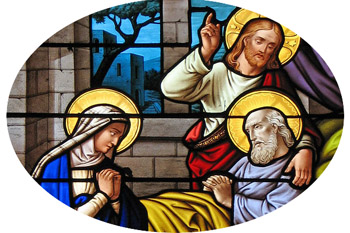 St. Camillus de Lellis always urged the members of his community to remind the dying frequently to pronounce the Holy Names of Jesus and Mary. St. Bonaventure gave this wise counsel:
St. Camillus de Lellis always urged the members of his community to remind the dying frequently to pronounce the Holy Names of Jesus and Mary. St. Bonaventure gave this wise counsel:
“Truly blessed is he who loves thy sweet name, O Mother of God, for thy name is so glorious and admirable that no one who remembers it has any fears at the hour of death."
He recommended all to say often this prayer to prepare for that moment of death: “I ask thee, O Mary, for the glory of thy name, to come and meet my soul when it is departing from this world, and to take it in thine arms.”
St. Joseph, who was attended by Our Lord and Our Lady at his fortunate death, is also invoked for a happy death for ourselves and others. A short and efficacious prayer to be said daily: O St Joseph, foster father of the Child Jesus and true spouse of the Blessed Virgin Mary, pray for us and for the dying of this day (night). Amen.
Although Extreme Unction is very important it is not indispensable for salvation. Salvation is obtained when a soul dies in a state of grace, having confessed all mortal sins or made a perfect act of contrition. St. Francis de Sales explains in his Treatise on the Love of God that a sudden death is not always a foreboding sign, if the person is in the state of grace and in the habit of love of God (see here).
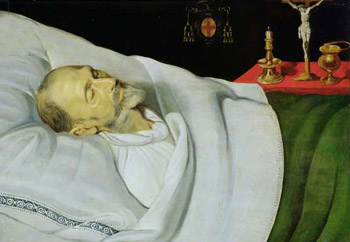 If you find yourself or someone you know dying with no priest, St. Louis de Montfort gives a concise list of the final dispositions that a person should have at their death, which can be found
here. He recommends renewing your baptismal promises, having the prayers of the dying said and responding yourself if you are able, and having the Passion of Our Lord read. Indeed many of the Saints have died hearing the Passion of Our Lord or the Prayers for the Dying of the Church.
If you find yourself or someone you know dying with no priest, St. Louis de Montfort gives a concise list of the final dispositions that a person should have at their death, which can be found
here. He recommends renewing your baptismal promises, having the prayers of the dying said and responding yourself if you are able, and having the Passion of Our Lord read. Indeed many of the Saints have died hearing the Passion of Our Lord or the Prayers for the Dying of the Church.
Ours are difficult times in which all of the fury of Hell is against the Church. We are also seeing the prophecies of Our Lady of Good Success fulfilled, who warned us that in the unhappy times that would come upon the Church in the 20th century, all the Sacraments would suffer abuses, neglect and disregard. Concerning the Viaticum, she said:
"The Sacrament of Extreme Unction will be little valued. Many people will die without receiving it - either because of the negligence of their families or a misconceived affection for their sick ones. Others, incited by the cursed Devil, will rebel against the spirit of the Catholic Church and will deprive countless souls of the innumerable graces, consolations and strength they need to make that great leap from time to eternity." (The Admirable Life of Mother Mariana, vol. 2, pp. 21-22).
Here are some prayers and counsels to answer your questions.
Cordially,
TIA correspondence desk
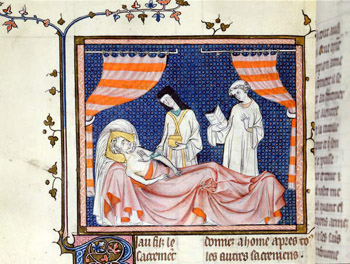

I have an inquiry on the topic of death. I and many of us need reminders, and I appeal to your thoroughness in responding to questions. These include:
- What recommended valid orders of priests should be called? What should one do when a Tridentine priest is not available? Should a sedevacantist or Eastern rite priest be called for the Last Sacraments, Confession, Communion, etc?
- How should we prepare as we wait for the priests? Should it seem we could die before his arrival, how do we get our souls into sanctifying grace?
- Finally, I had a booklet, pocket size, from a Canadian publisher titled Prayers for the sick, dying, and deceased. The instructions are for the moment we are leaving this earth. Is this still available?
Thank you,
C.L.F.
______________________
TIA responds:
Dear C.L.F.,
There is no more important moment to prepare for in the life of a Catholic than the moment of death. It is at this moment that the eternal destiny of his soul is determined. Today, this truth has been widely forgotten and many do not know how to prepare for death.
Spiritual preparation for Death
Catholics of the past were taught to pray every day for a holy death. There are many prayers written that are petitions for a holy death. One simple and efficacious prayer suitable to say everyday is the “Act of Resignation to the Divine Will”:

There is no more important moment than death for the Catholic, who faces his Private Judgment
In March 9, 1904, Pope St. Pius X granted a plenary indulgence, to be gained at the moment of death, to anyone who recites the above prayer after Confession and Communion. In addition to this prayer, Catholics should pray specifically for the grace to receive Extreme Unction, the Apostolic Blessing and Viaticum before death.
Viaticum means "provision for a journey," that is, Our Lord Jesus Christ is given to the dying person to protect and lead him to eternal life.
It is also beneficial to read good material pertaining to death and judgment. One such good book is Preparation for Death by St. Alphonsus de Liguori. The booklet you mentioned, Prayers for the sick, dying, and deceased, with its many worthy prayers and devotions is highly recommended. It is still available for purchase here.]
Some TIA articles that deal with this subject can be found here, here, here, here and here.
Practical preparations to receive the Last Rites
If a Catholic prepares for death throughout his life, he will find comfort in the graces of the Last Sacraments that will give his soul strength for the journey to the next life. All Catholics should make the necessary preparations and measures to ensure that they, their family members and their friends can receive the Last Rites.

A laughing Francis administers the ‘Anointing of the Sick’; no longer on the deathbed, but in church
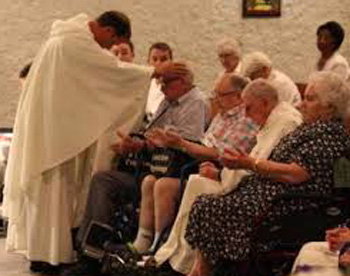
It is also good to have on your person or in your wallet or purse a card with the words “I am Catholic, in the case of an emergency, call a priest.” The name and number of your preferred priest should be written on the card. All your family members and friends should also have this information and be informed that you desire to have the traditional administration of Extreme Unction.
If no traditional priest is available, a Novus Ordo priest can be contacted as they can validly administer the Sacraments; however, the new rite of the “Anointing of the Sick” is seen by most Novus Ordo priests more as a blessing than a Sacrament and little mention is made of asking God pardon for sins. In some instances, the priest merely gives the person a blessing rather than anointing them with the Holy Oil. Also, many Novus Ordo priests have little to no sacrality and seriousness when they administer the Sacraments.
Indeed, the typical Novus Ordo priest’s understanding of the Last Sacrament can be understood from USCCB’s instruction page for the “Anointing of the Sick.” More emphasis is placed on the person’s healing and little to no mention is made of death or his private judgment.
The webpage concludes by saying: “But even if there is no physical healing, the primary effect of the Sacrament is a spiritual healing by which the sick person receives the Holy Spirit's gift of peace and courage to deal with the difficulties that accompany serious illness or the frailty of old age.” No mention of death is made.
Because of these progressivist ideas, we recommend that you make the effort now to make arrangements to receive the traditional rites for the Last Sacraments.
Preparing for the priest
There are preparations that ought to be made in a Catholic home to make it ready for the priest to come and administer the Sacraments to dying family members.

Traditional ‘sick call sets’ Catholics should have
in their homes
All of these items were placed in a sturdy box, and sometimes inside a crucifix or religious image that included a drawer or opening made expressly for that purpose.
In the past when the priest carried the Blessed Sacrament to a dying person, he wore the surplice and stole and was accompanied by an attendant who carried a light and rang a bell to announce the presence of the Holy of Holies. When the people heard the ringing bell, they would stop what they were doing to kneel to pay reverence to Our Lord in the Host.

Queen Maria Christina of Austria descends from her carriage to give it to the priest carrying the Viaticum
She would, often even escort the priest with her retinue back to the church from which they had come.
It is proper then, for the household to piously await the coming of the priest, and to receive him carrying the precious Host on their knees. The priest should then be escorted into the sick room in a solemn procession. There should be no trivial talk or joking.
The Sacrament of Extreme Unction
Extreme Unction is traditionally administered after the priest has heard the dying man’s Confession and received Holy Communion, which is referred to as Viaticum. The priest begins this solemn Sacrament by saying a set of prayers that call upon Our Lord, the Angels and Saints to drive away devils from the home and the dying man. The final prayer is as follows:

The great seriousness & respect shown
for the Viaticum in the past

After this, the priest anoints the sick person in the places that are the portals to his senses: the eyelids, ears, nostrils, lips, hands and feet, saying:
“By this Holy Unction + and his own most gracious mercy, may the Lord pardon you whatever sin you have committed by (sight, hearing, smell, taste and speech, touch, ability to walk). Amen.”
It must be noted here that this prayer was changed in the Novus Ordo Anointing Service so that it does not beseech God to remit sins. Following is the new form of the prayer found in the Roman Ritual of Paul VI: "Through this holy anointing may the Lord in His love and mercy help you with the grace of the Holy Spirit. May the Lord who frees you from sin save you and raise you up."
After the anointing, follows another set of prayers in the traditional rite that implore God to restore health to the sick man. If the dying man is very close to death, the priest often gives him the Apostolic Blessing, which imparts to him a plenary indulgence so long as his soul is in the state of grace. Thus, having received all of these graces from Holy Mother Church, the dying Catholic faces death with courage and hope.
Commending ourselves to Our Lady
In these evil times, we should strive to obtain the Last Rites for ourselves and our loved ones, but sometimes this is not possible. In such cases, we must commend ourselves to Our Lady and strive to remain in the state of grace and develop habits of virtue and the love of God.

The death of St. Joseph assisted by Our Lord & Our Lady made him Patron of the dying
“Truly blessed is he who loves thy sweet name, O Mother of God, for thy name is so glorious and admirable that no one who remembers it has any fears at the hour of death."
He recommended all to say often this prayer to prepare for that moment of death: “I ask thee, O Mary, for the glory of thy name, to come and meet my soul when it is departing from this world, and to take it in thine arms.”
St. Joseph, who was attended by Our Lord and Our Lady at his fortunate death, is also invoked for a happy death for ourselves and others. A short and efficacious prayer to be said daily: O St Joseph, foster father of the Child Jesus and true spouse of the Blessed Virgin Mary, pray for us and for the dying of this day (night). Amen.
Although Extreme Unction is very important it is not indispensable for salvation. Salvation is obtained when a soul dies in a state of grace, having confessed all mortal sins or made a perfect act of contrition. St. Francis de Sales explains in his Treatise on the Love of God that a sudden death is not always a foreboding sign, if the person is in the state of grace and in the habit of love of God (see here).

The serious Catholic is well-prepared for death,
spiritually & practically
Ours are difficult times in which all of the fury of Hell is against the Church. We are also seeing the prophecies of Our Lady of Good Success fulfilled, who warned us that in the unhappy times that would come upon the Church in the 20th century, all the Sacraments would suffer abuses, neglect and disregard. Concerning the Viaticum, she said:
"The Sacrament of Extreme Unction will be little valued. Many people will die without receiving it - either because of the negligence of their families or a misconceived affection for their sick ones. Others, incited by the cursed Devil, will rebel against the spirit of the Catholic Church and will deprive countless souls of the innumerable graces, consolations and strength they need to make that great leap from time to eternity." (The Admirable Life of Mother Mariana, vol. 2, pp. 21-22).
Here are some prayers and counsels to answer your questions.
Cordially,
TIA correspondence desk

Sources:
- (Rites of Anointing and Viaticum) https://saginaw.org/sites/default/files/2018-01/Pastoral_Care_of_the_Sick.pdf
- https://www.usccb.org/prayer-and-worship/sacraments-and-sacramentals/anointing-of-the-sick

Posted on September 22, 2023






